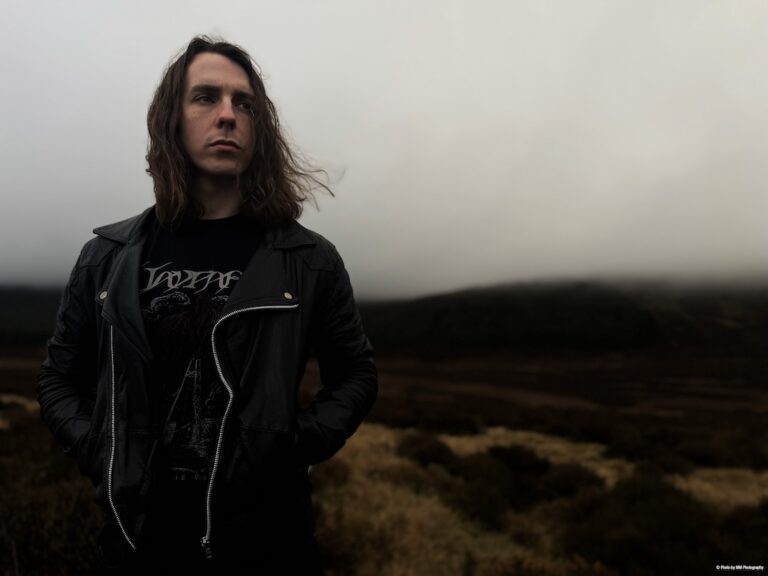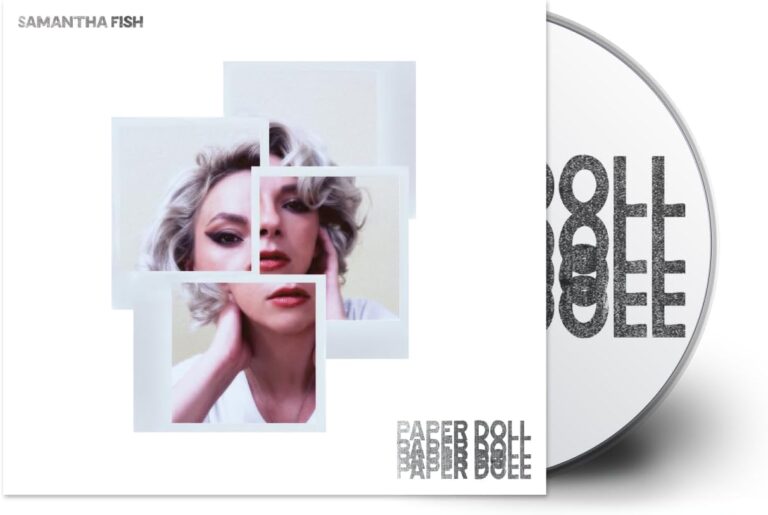To paraphrase Yes Minister, Jaz Coleman is the sort of person who could follow you into a revolving door and come out in front. Fiercely intelligent, and possessed of a fiendish sense of humour, he switches between music, politics, spirituality and science in the blink of an eye, keeping the interviewer very much on their toes. Yet, whilst it might seem that Jaz can be intimidating (and he surely can be if his temper is roused), it is both a privilege and a pleasure to speak with him. Ever courteous, he takes his time to ponder each question before giving a considered answer and his absolute love of his craft shines through in every answer, to the extent that he is as inspiring as he is inspired.
Speaking from an hotel room in London, he is here to promote his new work, a remarkable orchestral piece that reinterprets Killing Joke into a Gnostic Mass. It is a passion project, of which Jaz is justly proud, and he generously takes his time over the interview, going into considerable detail about its conception and the themes that underpin both it and his entire philosophy.
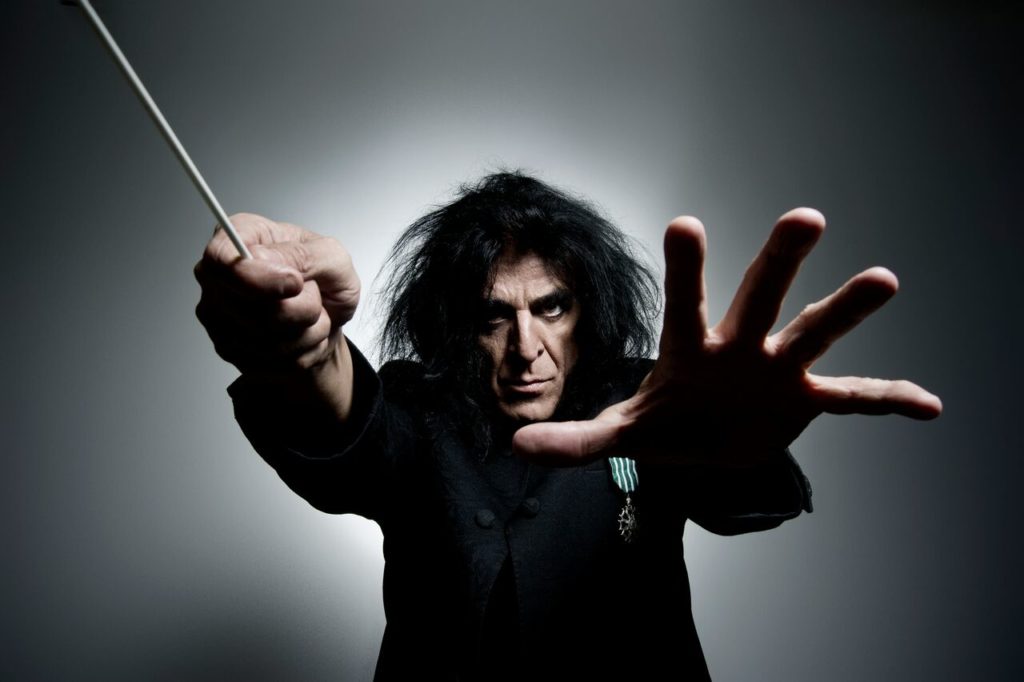
I’ve seen you say in other interviews about this piece of music that you’ve made that it’s potentially your favourite album, your favourite killing joke album…
No, no, it’s my favourite album of anything I’ve ever done ever.
And, within that, I believe you said that you wanted to create, musically, a more desirable reality…
That’s right.
For me, music as an art form is a way of expressing yourself, potentially without words, and it’s a very different beast, I think, to work in the classical realm, and I wondered about this idea of creating a more desirable reality and what that means to you in musical terms.
Well, in musical terms, I associate Killing Joke normally with dissonance and dissonance with the more revolutionary side of my career, which, of course, is killing joke. And, dissonance that resolves to pure harmony, is what I’m talking about. It resolves, and this is the neo-romantic idea – a passion that I have for orchestra – and it’s the opposite to killing joke in so far as the orchestra is the perfect medium for projecting the romantic notion. Ideas, for example, such as eternity or beauty or nature or this kind of thing. I certainly wouldn’t use electric instruments to express these things, so yes, that’s right, that’s exactly what I’m trying to do.
The work, Magna Invocatio, is there to lift people’s spirits, to a different place. Yes. To planetary consciousness. If you have a quick look around the world, you’ll notice that, unlike the last cold war, the new cold war has many nation-states armed with nuclear weapons that point in all sorts of directions. So, you see, what you have to understand is that when anybody on the world stage talks about the next war, or arming themselves or, indeed, “winnable nuclear wars” … Mad people talk about this kind of thing. You have to take into consideration that one, just one, nuclear bomb dropped on London would take out Paris, Edenborough… in fact, pretty much all the way to Iceland, it would wipe out all life – one bomb. One exchange between India and Pakistan would send us all into a nuclear winter of fifteen years and crop failure – mass starvation. So, you see, these people are quite insane (laughs) and you think I’m mad!
Fuck, eh? Fuck! Look at them out there! So, you know, from my perspective, the last… the finale of Magna Invocatio, the task ahead of me there was to score, for chorus and orchestra, world peace and whatever it sounds like, you know. Which is quite a task. But, you know, I got there. And, this isn’t just a choral symphony, it’s magical – it has a magical life of its own and nobody can stop it now (laughs). It’s funny to watch. Essentially, I am an animist and, from my perspective, I breathe life into my art form and, at that point, it has a life of it’s own, yes? It takes me with it, that’s how it is from my perspective.
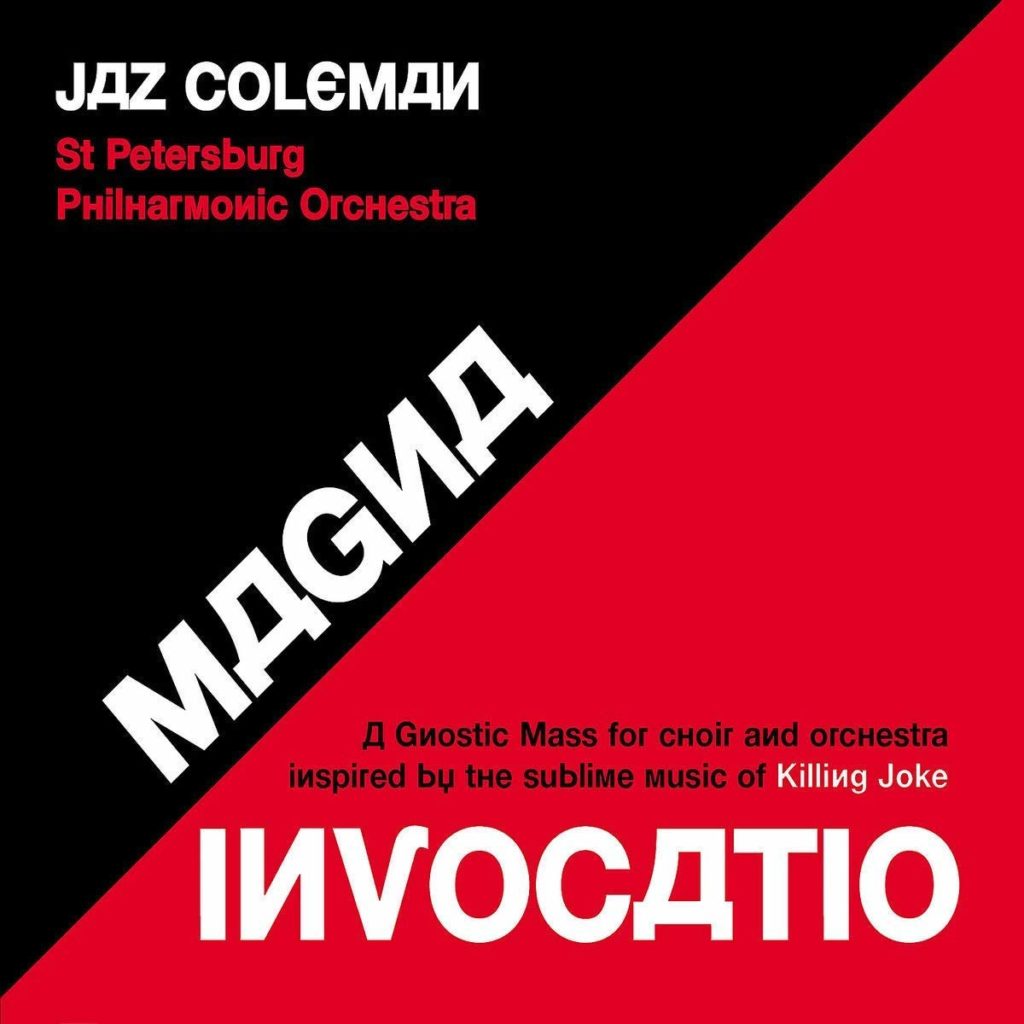
Within this piece, I believe you include, as lyrics, the oath that you and Big Paul took –
That’s right…
That’s very interesting to bring your artistic career full circle in that way….
And, when you take into consideration that it was killing joke that paid for my classical studies in orchestration,
and now I give back to that which nourished me, so it has great meaning for me.
I also believe that you used Sumerian language for this – was that a challenge to bring that to life and, moreover, to bring that to the chorus who then have to enact that for you?
Well, it was an incredible discovery. You know, I had a choir of forty people who began uttering a prayer, indeed and invocation, that hasn’t been uttered for fourteen thousand years. So, it was thrilling, and we had the professor of etymology from St Petersburg University, who instructed the chorus in how to pronounce the Sumerian (as best as we know – they can get pretty close) and, from there, by the time I got to St Petersburg, the audience was already trained and rehearsed by the time I got there and it was a pretty stunning experience. I have to say, and I’ve had a pretty colourful life, but recording this album was one of the highlights of my life. It was one of the peak experiences.
To return to something that you were saying earlier about the potential for catastrophe on a global scale, I believe that the opening parts of this music are based on the Lucis Trust… theme, for want of a better word…
The Great invocation, which is the title of the entire work, but the Latin version of it… That’s what Magna Invoocatio means – the great invocation, which is the official text of the Lucis Trust, which is the spiritual arm of the united nations. Correct.
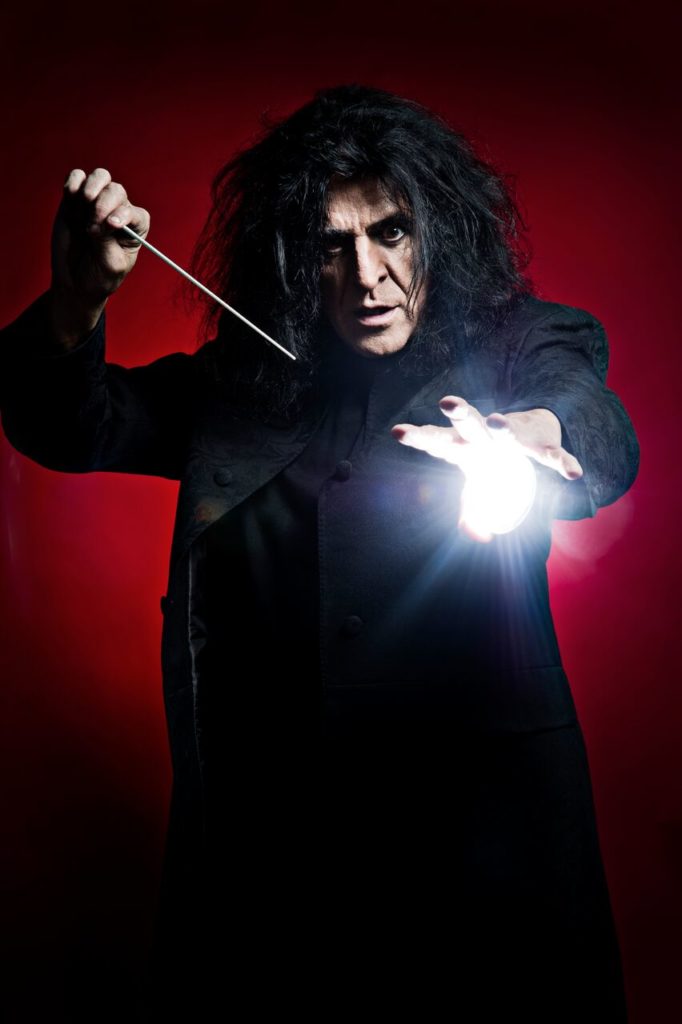
They still are, the Alice Bailey connection, in favour of one-world government. Do you still see that as having the potential to head off calamity?
Let me state my case very clearly. As we were talking about earlier, we have, you know, Israel has 200 nuclear weapons, Brazil supposedly has some nuclear weapons, and there are some member states that we don’t know about that aren’t in the UN Security Council that have nuclear weapons, so it’s a very unstable world. So, if we have nation-states… and, of course, to add to our woes, capitalism (our greed has been growing at an exponential rate), the combination of this could set our evolution back millions of years, we’re that close to nuclear war – we’re one minute to midnight on the clock.
Here’s the thing, you see, at the moment in the world there are two models being argued about. One, is polycentric global governance and the other is unicentric global governance. Ok, there are two models there and they are in opposition with one another at the moment – that’s what’s happening on the world stage at the moment as I see it. Now, the fact is that, years ago and this is the point, let’s look at civilisations and what they mean. There was a Russian physicist called Kardahsev, and he said essentially that there are type one, type two and type three civilisations. Type one civilisations draws energy from the solar system. A type two, I think, is from a star and type three draws energy from a Galaxy and can indeed seed life forms and has mastered time and space. That’s type three. We are zero. Right? On the Kardashev scale. Generally speaking, a civilisation making the transition from a type zero civilisation to a type one civilisation often destroys itself. You only have to look at the “Mahabharata” – the records of ancient nuclear war to happen in the past. The Indians – the Asian sub-continent – knows about this, you see, the Mahabharata – I’ll quote you some:
It was an unknown weapon, some six cubits by four that shone in all its splendour, brighter than ten thousand suns. The soldiers, who themselves, in the streams but in vain, their hair fell out, their nails fell out… and it goes on – oh bringer of death, etc. etc.
Oppenheimer quoted this. Anyway, the point being that we have that choice now – to go one way or the other. We are in that transition where we could go from a type zero civilisation to a type one civilisation and, in order to avoid complete nuclear catastrophe, it might be a good idea if we stop pointing thousands of nuclear weapons at one another, which is increasing the likelihood of a chance encounter. It could easily get out of hand. It’s quite likely. Let’s have a look – Elon Musk says that nuclear war is inevitable, so, there you go, I’m quite positive, generally speaking, when I look at it.
So, in order to counteract this, somehow, we have to… however diverse our ways are, we have to reach planetary consciousness. For myself, I believe in a council of nations, OK, as it were. Which is the polycentric world governance model, if you like. Which is in contrast to a unicentric, Anglo-American-led model. Do you follow me?

Yes, absolutely – this is something that, from our last discussion, I’ve had a chance to read about and I’m very interested in the dynamic of nation-state formation and one of the theories that underpins globalisation is related to the cultural ties that bind as well as distinguish and, clumsily, I wonder if the Gnostic mass, as a piece of art designed to invoke human consciousness, is your way of bridging the divide?
Spiritual gaps. Man is without spiritual compass and so, yes, well… of course art is. It was Laurence Darrell who said: “When the mob becomes the artist, we will have entered the golden age” and I’m inclined to agree with this, this is the role of the arts – you know, here we are, on the verge of 70% of the world’s workforce being laid off in favour of artificial intelligence. So, the arts will play a great role in the future. You see, we need to beautify the planet – a more desirable reality – we have to have the concept of the beautification not the ugliness that comes with the concept of greed and capitalism. So, I believe very much in the mission of the arts. And the second thing I’d like to say, in relation to the arts is that, if you notice (I don’t know whether you’ve noticed, but we’ve noticed) that art has been relegated in terms of its role and importance in state education and there’s one simple reason for this. The reason is, of course, that art is seen by dubious governments as a potential nest-bed for dissenting voices.
Which traditionally art has been – a lot of artists have used art as a platform for social, economic or political consciousness-raising because art has the potential to reach a community that goes beyond the traditional nation-state boundaries.
That’s right. That’s right – they do. Likewise, the occult agenda. I mean, let me be frank about why I have always been revolutionary in my ideas about religion., If we consider for one second that the quantum physicists say – that we are all participants in creating our reality. If this is the case, which I believe it is and magic says that the same thing – that magic is to create change in accordance to the will – it’s the same thing – if this is the case, then when we study the Patristic religions of Judaism, Christianity and Islam, these religions are essentially apocalyptic cults. Their messiahs and everything – everything is hinged on apocalypse. The entire visualisation of the three religions are the foundation of apocalypse. If this is the collective, mass-visualisation, then what the hell can you expect? That’s why, in my opinion, we need to take a radical step away from these religions and, from a gnostic perspective, and this is misunderstood by the David Ickes of this world, the God of the old testament and the Christians is guilty of genocide if you study theology. And this is what you’re invoking?
It says: if a woman shall be found menstruating in a holy place, she should be stoned to death etc etc… and then, when Yahweh says “every man, woman and child shall be slain…” If you have a good look at it, you have to wonder: what is this god form? How should we describe it, this inorganic predator that this mass consciousness is invoking? I’ve thought long and hard about this and that’s why I align myself with gnostic tradition that sees Yahweh as the demiurge or the dark god, you see. You have to really study the analogues of the architypes and go back to the Sumerian legends where, basically, the Yahweh architype was, of course, Enlil, who ordered the floods and destruction of mankind and the defender of mankind was Enki, who was the analogue of the modern-day Satan. There you have it, you see, there’s a misunderstanding. Christians normally project very simplistic, dualistic notions of black and white – man good, woman bad, on to these ancient archetypes and, of course, it’s misunderstood.
These binary distinctions seem to typify society but, in the last ten years, through gender studies and political studies – the breaking down of the sexual paradigm and also the breaking down of political models – is there, in your view, we could open up a more fluid conceptualisation of humanity?
Yes, well, first of all, we’re living in a post-democracy – can you define what post-democracy is… There isn’t any! We have to make certain strides, which is very difficult at the moment, to get everyone on the same page on this planet. It’s a very difficult thing as things stand at the moment because we’re fragmented. But we’re also more connected than you think and if you just take one simple cosmic event, I think it would probably unify us and if you look at the ninth movement, that’s really about this process that I’m referring to…
Is that adorations?
No, it’s into the unknown. That was the structure of the original, but of course I go off the beaten track as it were. You’ll understand what I’m talking about on the thirteenth of October, if you have a look at the websites.
Looking back at interviews you’ve done in the past, you’ve described yourself as, with killing joke, a revolutionary but, with classical music, reactionary… and I was wondering if you could expand upon that idea?
Let me put it like this. You know, I divide the personas that I have between… I describe them to myself as The Hermit and The Communist, right? With Killing Joke it’s a collective thing – it’s a very, very different thing to when I’m composing for orchestra, which is The Hermit. It’s one man’s vision as it were. They’re very, very different experiences. I remember when I had a number one for orchestral music for 108 weeks in America, and they told me that it goes off the charts after 108 weeks and I remember, when I was told this, I was in New York, I poured myself a whiskey and went to bed – there was no one to share it with (laughs). Anyway, that is the single experience which is, if you like, the individual, which I will say, for want of a better word, you can call it reactionary or whatever you like – it’s one man’s vision, a magical vision. Then there’s the collective side. You know, for me, Killing Joke is more of a social function for myself, you know, it stopped us turning into common criminals. It’s a revolutionary art form and we did it to keep sane in these dark times. And, it’s been an effective surrogate for the aggressive war impulse in ourselves.
I think, as a parallel to what you’ve done in this gnostic mass, you’ve done some work reinterpreting Nirvana?
That’s right! You’re getting ahead now – that’s next year! (laughs)
I didn’t want to ask specifically about that, but rather I’m interested in…. in rock music there’s a sort of purist notion of being the creator of an original piece with covers often seen as something extra – like a b side or bonus. But in classical music, the art in many ways (especially as a conductor) is to reinterpret a piece of art and I wondered about that act of creation, particularly in terms of the Killing Jokes that informed this record?
Well, how I got into all this is very simple. When I look at classical music from a historical perspective, the 20th century is extremely boring for myself, with twelve tone scales – it becomes incredibly cerebral. So, I have always felt that the greatest composers of the twentieth century were the rock musicians. I’ve always felt this and for me to score this great music in a serious way, as a symphony, has always been my goal since day one and, indeed, I’m benefitting from it now. It allowed me to get right inside the chemistry of some of the greatest bands and understand musically how they work and that’s been great. And scoring all these amazing bands from history, often with the consent and working alongside some of the composers who are still living, I get to then address the band that I find myself in, which is a strange and incredible experience.
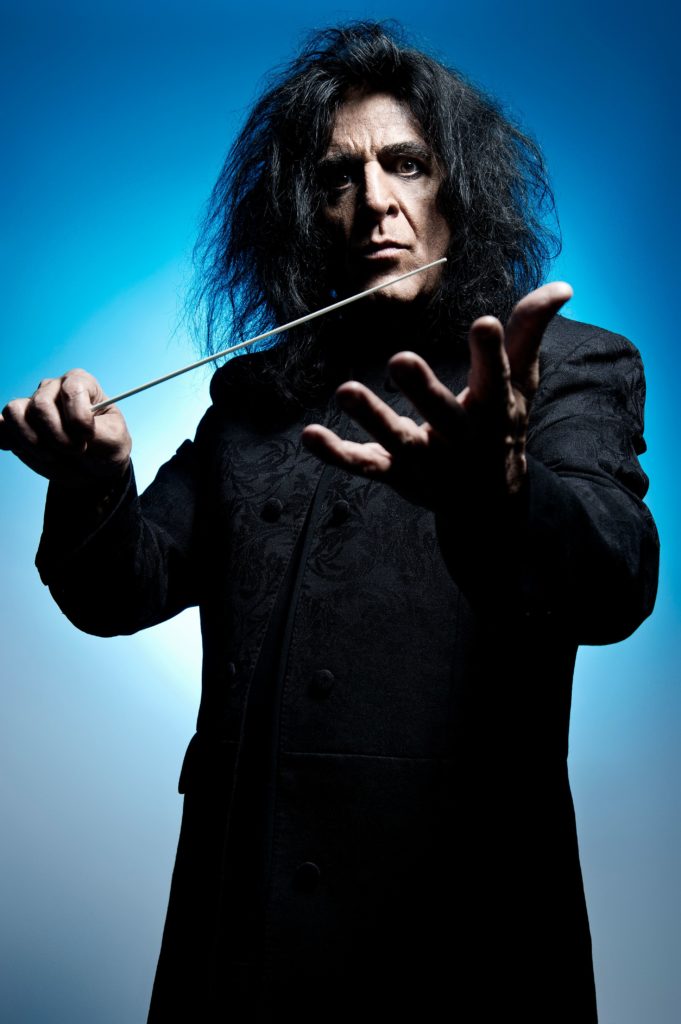
In so doing, it’s almost impossible that what you’re doing here won’t inform your work with Killing Joke, so there’s a circularity there too…
Well, of course it is Killing Joke and yes, that’s right – it’s a great celebration. It’s the only recording I’ve ever done where I’ve listened to it every single day of my life since the recording. I cannot stop listening to it. It’s simply the most important recording of my life… to date. Period.
Is it possible that, as a conductor, you would consider touring something like this?
For sure! There’s no doubt about it. All we have to do is survive! There’s no question about it. Of course I’ll do it.
That would be remarkable – classical music is so powerful in the flesh.
My guess, and it’s just a guess, is you probably won’t have to wait long.
My final question is, again, there was a phrase you used when talking about this – because it’s gnostic whereas much of the musical art form from which this draws inspiration is religious in nature – you created a “circular mass”: you took the dogma out of the artform to create something that is uniquely yours…
Well yes, seen from a gnostic perspective and I do – you know my history – there are no surprises there. It’s great to present a spiritual work, because I believe Magna Invocatio is exactly that – but it’s a spiritual work which is not aligned to any of the religions I was referring to.
So, this notion of circularity, is that it presents a complete world view form your perspective rather than an aligned perspective?
Well, I mean, the idea with all notions of comparative religion is to dissolve all division.
So, that becomes the overarching design here – to create community through art…
Incredibly so. I believe this is the case. By the time you reach the end of the final movement, Gloria, you can at least glimpse my notion of planetary consciousness.

